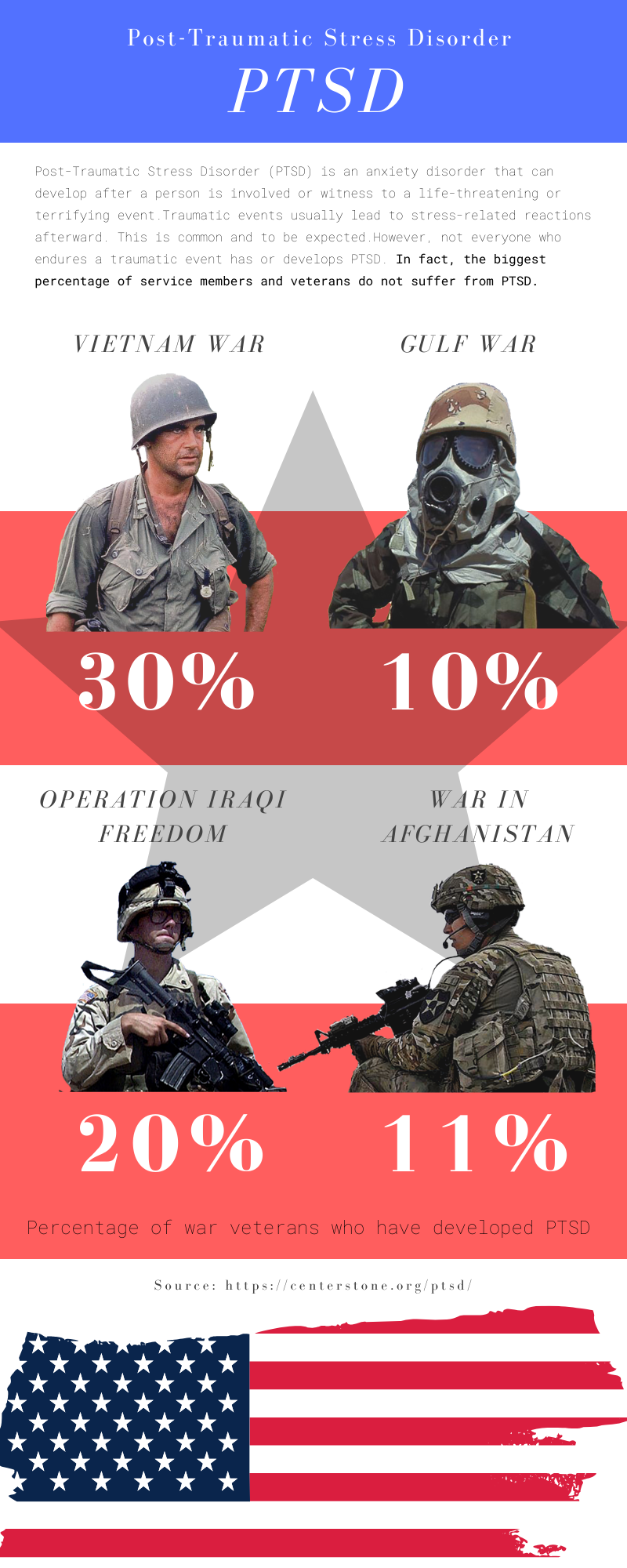Home /
What is PTSD?

How do I know if I have PTSD?
The process of identifying and diagnosing PTSD can vary from person to person. There are several common symptoms that can show up.
Note: Even if you or your loved one has been screened in the past, it may be valuable to reassess the situation since symptoms of PTSD often develop or worsen over time.
Symptoms can include (but are not limited to):
- Flashbacks
- Nightmares
- Emotional numbing
- Avoiding activities once enjoyed
- Hopelessness about future
- Memory problems
- Difficulty concentrating
- Avoiding thoughts and discussions about traumatic events
- Difficulty maintaining close relationships
- Irritability and/or anger
- Guilt or shame
- Self-destructive behavior
- Disturbed sleep
- Hyper-vigilance and/or easily startled
- Hearing or seeing things that are not there
- Depression
- Anxiety
- Heightened stress levels
- Gastrointestinal problems
- Unexplained pain
- Unprovoked fear or distress
- Extreme mood swings
- Seizures
- Suicidal thoughts
Once you or your loved one recognizes the signs and symptoms of PTSD, begin to seek care options.
This is often a difficult decision for a number of reasons.
Many people resist seeking help out of fear of being thought of as weak. Or, losing the confidence of those around them.
Adding to the difficult nature of this disorder, a person dealing with PTSD may also convince themselves that treatments will be ineffective or will cause side effects.
Despite these reservations, it is important for someone suffering to get help.
Without treatment, PTSD does not get better. And, in some cases, it can worsen.
Treatment is important at any stage regardless of whether you or your loved one has been suffering for months or years. It’s never too late to reach out for help.
Why can’t I just ‘get over PTSD?’
If a person suffering from PTSD could simply “get over it,” they would.
PTSD is not just remembering the trauma over and over. It is a painful and disruptive issue that plagues not only service members and veterans, but civilians as well.
It causes physical changes in the brain and body that bring a wide range of symptoms.
PTSD Recovery: Intrusive Thoughts
Intrusive thoughts are the high energy stress bubbles that blow up in the faces of combat survivors. They slam us into the multidimensional horror and anguish of our inescapable memories. Some flashbacks happen without a trigger. I’ve learned that, when I pay attention to my flashback, something has happened around me that triggered it. The basic flashback triggers are sensory. This means that our senses feel, taste, smell, see or hear something we associate with combat and triggers the intrusive thought.
Here’s one that took me a couple of years to figure out. We have a high-quality public radio station in Anchorage. This station plays classical music most of the day. I listened to the station in my office during the workday. Sometimes, while working on a project, suddenly I’m standing at attention. I hear the names of our most recent KIAs being read. I smell red dust, feel sweat running down my face, my fists tighten and my teeth clench. My rage rises, wanting more than anything to get some payback.
I’m There
At the 25th Infantry battalion base camp along Highway 1 in central I Corps.
“…his unswerving commitment to his duty and his unselfish sacrifice are a credit
to himself, his unit and the United States Army.”
The words came forth with no conscious effort. How many times have I heard the words? How many wives and parents and children heard the words? The starched neatly folded American flag presented to them formally. The three volleys of seven shots fired and echoing in the distance. The loss, the hurt, the desperation, the disbelief set to music and a long bugler plays Taps. And the feeling described so well in a song from long ago settles on me, “Is that all there is?” Even now, the feelings come without the words to express them.
Just as quickly, I would be back in my office, soaked in sweat, heart pounding – overrun by unspeakable sadness. It took about eight months for me to make the connection that the trigger for that flashback was a piece of soft background classical music. That piece had also been used in the movie Platoon. Making this connection was the key to learning how to moderate the unexpected eruption of memories and feelings.
From then on, when that piece of music plays, I use those moments to remember and honor my brothers. It’s the same me in the same place with the same trigger for a flashback as before. The difference now is that I choose to connect my reaction to this specific music and make a different choice about how to respond to it. I learned this technique from my brother, Ned Neathery, during a combat debriefing group session.
Moving Forward
Instead of being overcome by the rage and guilt and anguish that kept me separated from my people, now I picture each of them in my mind and heart so I can say what I really feel: “I love you, brothers.” What Ned and I and the other warriors in our combat debriefing group learned was that there is always more love than pain.
Feeling that we are not in control of our reactions means that something or someone else is responsible for how we feel and our behavior. Not true. Of all people, who knows better than a warrior that we are responsible for our actions, our behaviors and our choices? This part of recovery is difficult and often it’s not fast. Naming our anguish, our rage and our fears we learn the relationship between ourselves and our most intimate losses. With that understanding and acceptance, we begin our journey home.
 Ken Jones is a Vietnam combat veteran (11th Cavalry 67-68), a speaker, an advocate, and a writer. His focus is recovery from combat induced PTSD. Supporting our troops, veterans, and their families as they work their way through recovery from PTSD drives Ken to be actively engaged on Twitter, Facebook, and other social media venues. Although he served eight years as a volunteer and staff counselor at the Anchorage Vet Center, he is not a clinician. His comments and observations are based on his own experience of living with combat induced PTSD for the past 40+ years.
Ken Jones is a Vietnam combat veteran (11th Cavalry 67-68), a speaker, an advocate, and a writer. His focus is recovery from combat induced PTSD. Supporting our troops, veterans, and their families as they work their way through recovery from PTSD drives Ken to be actively engaged on Twitter, Facebook, and other social media venues. Although he served eight years as a volunteer and staff counselor at the Anchorage Vet Center, he is not a clinician. His comments and observations are based on his own experience of living with combat induced PTSD for the past 40+ years.
About Centerstone Military Services
Centerstone Military Services serves everyone whose lives are impacted by military service including veterans from all active duty and reserve components (Army, Navy, Air Force, Coast Guard and Marines) – regardless of discharge status.
Services for immediate and extended family members, loved ones, friends and colleagues of those who have served are also available.
You do not have to be in a current crisis to call or email Centerstone for help.
Simply call 866.781.8010, available 24/7, or email our counseling line at MilitaryService@centerstone.org to learn more.
All treatment options include you in the decision-making process.



